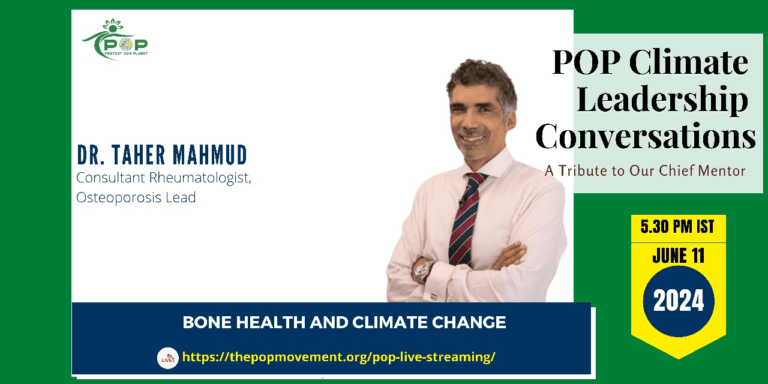
- This event has passed.
Bone Health and Climate Change: A Leadership Conversation with Dr. Taher Mahmud
June 11, 2024

During our 53rd POP Climate Leadership Conversations — A Tribute to Our Chief Mentor, we had the privilege of hosting Dr. Taher Mahmud, Consultant Rheumatologist and Osteoporosis Lead, to discuss the intersection of climate change and bone health. In response to Ana Hanhausen’s question about what leadership means to him, Dr. Taher articulated a profound vision of leadership. He emphasized the importance of self-awareness and appreciation, suggesting that true leaders possess a deep sense of awe about themselves. He highlighted the role of training and mentorship in reaching higher levels of personal and professional development, and from those heights, serving others. Dr. Taher underscored the value of curiosity and responsibility, viewing them as essential for growth. He also stressed the importance of learning quickly and maintaining peace amidst challenges. Additionally, he spoke about the significance of working on all aspects of oneself to positively influence those around us and exemplifying the qualities one wishes to communicate.
Manish Gupta then asked about the connection between climate change and bone health. Dr. Taher explained that factors such as activity and nutrition are crucial for maintaining bone density. He noted that anything affecting our overall health, including pollution, nutrition, and access to resources, can also impact our bones. Weakened bones are more prone to fractures, which can significantly affect general health. Dr. Taher emphasized that the interconnectedness of health means that what affects one person affects the entire community. He shared a resource for assessing bone health risks, urging people to prioritize their own wellbeing before attending to others. The questionnaire can be found at The Sticks and Stones website.
Prince Sharma, a Trainee Mentor, asked Dr. Taher if recognizing the link between health and climate change could lead to more rapid and effective climate action. Dr. Taher affirmed this, stating that making connections between personal stories and actions is crucial. He believes that when people understand the tangible impacts of climate change on their health, they are more likely to find their way to meaningful actions and values. Dr. Taher stressed the importance of providing materials that address people’s curiosity to foster deeper understanding and engagement.
Drishya Pathak’s question focused on how the link between health and climate change might influence young health professionals’ career approaches and specialties. Dr. Taher noted that this connection is becoming increasingly established. He emphasized that progress in this area requires relatable narratives that resonate with people on a personal level.
Lastly, Sayan Das, a Trainee Mentor, asked Dr. Taher for advice on maintaining healthy bones in a changing climate. Dr. Taher highlighted the rapid changes occurring and how they affect our bones. He advised being mindful of dietary choices, such as consuming vitamin D, nuts, and plants, and engaging in gentle exercises to improve muscle strength. He pointed out the significant negative impacts of smoking, alcohol, and inactivity on bone health. Additionally, he advocated for fostering a sense of community, referencing the concept of Blue Zones, where people live longer, healthier lives.
Dr. Taher Mahmud provided valuable insights into the intricate relationship between climate change and bone health, emphasizing the need for awareness, proactive measures, and community support to navigate these challenges effectively.
Dr Taher Mahmud is a distinguished consultant rheumatologist based in central London and Tunbridge Wells. He is renowned for his expertise in osteoporosis, osteopenia, osteoarthritis, rheumatoid arthritis, ankylosing spondylitis, and inflammatory arthritis.
Additional to his clinical practice, Dr Mahmud has held a number of esteemed positions in public associations throughout his career, with a particular focus on improving patient experience and outcomes, including as a member of the MTW Patient Experience Committee and as an organizer and chair of conferences on patient experience at the Royal Society of Medicine. In recognition of his commitment to drive improvement in this area, he was awarded an NHS Innovations award for patient feedback. He has also been actively involved in medical education throughout his career, having lectured and trained a wide range of medical students and fellow practitioners.




